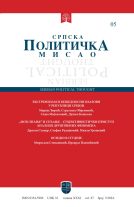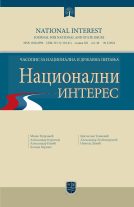- Home page
- Researchers
- Dr. Milena Pešić
Dr. Milena Pešić

- Address: /
- Email: milena.pesic@lux-dog.com
- Telephone: /
- LinkedIn: https://www.linkedin.com/in/milena-pe%C5%A1i%C4%87-17899620/
Resercher
Institute for Political Studies
2004-
Faculty of Political Studies, Belgrade University
PhD
2016
Department of the theory of culture, Faculty of Political Sciences, Belgrade University
MA
2007
Faculty of Philology, Belgrade University
BS
2004
Milena Pešić, Research Associate, is professor of literature (BA) and culturologist (MPhil, PhD). She is a member of the Center for the Culture of Remembrance at the Institute for Political Studies, a member of the editorial office of the scientific journal "Political Review" and a member of the management board of the Institute's Library. Her research area, within a multidisciplinary field of Communication, Cultural studies and Politics is centered on the following problems: The Public Sphere; The national and cultural identity; Discourse and Discourse Analysis, Media Discourse. She published a numerous papers, one co-author monograph “Sloboda i javnost – određenje, problematizacija i značaj” (co-author Aleksandar Novaković, Institute for Political Studies, 2008) and the monograph “Satirička naličja srpske modernizacije: kritika društvene i političke stvarnosti Srbije druge polovine XIX veka” (Institute for Political Studies, 2021).

POLITICAL DISCOURSE IN THE RESEARCH LENSE OF THE CONTEMPORARY CRITICAL STUDIES
Starting from the thesis that critical discourse studies, with their qualitative, critical and explanatory approach to the study of political communication, represent a valuable complement to the dominant approaches that privilege the positivist paradigm and quantitative research, in this paper we tried to provide more complex insights into the scientific contributions of these studies to the study of political discourse, through observing the specifics of their theoretical-methodological frameworks, analytical categories and interpretive procedures. For this purpose, some of the key features of Teun van Dijk's sociocognitive approach, Paul Chilton's cognitive-linguistic approach, Ruth Wodak's discursive-historical approach and Norman Fairclough's dialectical-relational argumentative approach were considered. In the introductory part of the paper, we provided an overview of the general distinctive features, main starting points and research interests of the critical analysis of political discourse, as well as an insight into the basic dilemma related to the scope of the content of the term “political discourse”. The central part of the work consists of two complementary parts. In the first part, we started from the presentation of the analytical aspects of the following levels and dimensions of the political discourse structure: topics, superstructures or textual schemata, local semantics, lexicon, syntax, rhetoricand speech acts. Using an analytical-synthetic approach, we connected the semantic-grammatical dimensions of the textual level and the cognitive-pragmatic dimensions of the discursive level of production and analysis of political discourse. The second part of the central part of the work is focused on the presentation of the theoretical framework of the argumentative approach to political discourse, as a kind of upgrade and reframing of existing conceptual settings and analytical categories. In the concluding review of the insights reached in the article, as the main scientific contribution of critical studies of political discourse, we singled out the way in which is achieved the synthesis of systemic, but contextually sensitive textual analysis on the one hand, and descriptive, normative and explanatory viewpoints of critical social research, on the other.

NATIONAL IDENTITY IN THE LIGHT OF ITS DISCURSIVE CONSTRUCTION
The central interest of this paper is the investigation of the phenomenon of national identity from the point of view of its constructional character. With this aim, a synthetic presentation of key modern and postmodern theoretical starting points and ideas that support this line of his conceptualization is given first. Instrumentalist approaches to national identity are observed, which treat it as historically situated and socially and politically constructed, through connection with the phenomena of modernity and the role played by state political projects and state elites in its formation (Hobsbawm, Gellner). Developed on the same basis, national identities were observed through looking at the building of feelings of belonging, solidarity and togetherness, through collective practices of reception and interpretation of common cultural and historical references (Tijes, Renan). As particularly relevant to the topic of this work, we focused on ideas about the imaginary in identity affirmation in settings (Bajar, Anderson), because we consider that line of conceptualization to be the basis of modern understandings of national identity as a primarily mental construct. As an instrument and medium of the nation's imagination, culture is apostrophized, developed with the emergence of “printed” language. We also find the primacy of culture in Smith's statements of national identity as constructed on ethnic grounds, based on the concept of cultural configuration. We tried to present contemporary approaches to national identity (Hall, Bhabha, Matrin, Vodak) in the light of their basic common features – the operationalization of modernist concepts in a new constructionist and discursive key. By moving the study into the area of discourse and the process of meaning generation, these approaches deconstruct the metanarratives of the nation, through (linguistic) analysis of their constituents, and seek to explain how national identities are socially constructed through discourse, using language in systematic ways. With this presentation of the development of a complex of ideas and analytical positions, we tried to point out the key assumptions for the creation of modern conceptual-analytical models. At the same time, the scientific basis of the model of discursive construction of national identity created within the framework of the contemporary discourse-historical approach, whose presentation is the second thematic centre of this paper, was demonstrated. This three-dimensional analytical model (macro-theme content, strategies and linguistic means) offered systematic ways of viewing national identity as a product of specific strategies of expression in specific historical and institutional locations, with specific discursive formations and practices. The fact that it is widely used in contemporary case studies best confirms its analytical productivity and indicates the scientific relevance of its theoretical elaborations.

Ketman – Transideological Phenomenon or Concept That Masks the Fear and Opportunism
The research on the pluralistic nature of the phenomenon of “ketman”, which is at the same time as the art of duplicity, manifested in the sphere of (political) communication, social- psychological and psychological level is the main topic of this paper. Czeslaw Milosz‘s interpretation of this phenomenon was more than instructive in this regard, so his insight gained the central importance in the paper. As a form of dissimulation, the system of response to the political repression, a hidden form of (political) differences and socially shaped form of concealment ,”ketman” presents a very complex phenomenon that goes well beyond such a term for masking the sheer fear and opportunism, as determined by one of the critics of Czeslaw Milosz’s study. Starting from the idea of a religious mask, taken from the Islamic tradition, Czeslaw Milosz singled out two of its dimensions: the moral principle that justifies the application of religious cunning disguise, thus providing a kind of satisfaction and sense of superiority of one who practices ”ketman”, and the moment of the hypocrisy of skills. These two dimensions of Gabineau's idea were developed by deepening their psychological, cultural and anthropological sense. Exploring the phenomenon of “ketman” in Polish society under Stalinist repression, the author has come to the definition of modern ideological forms of “ketman”: “national ketman”, “ketman of revolutionary purity”, “ketman metaphysical”, “aesthetic ketman” and “ethical ketman”. Offering meticulous analysis of the circumstances, reasons and consequences of each of these types of “ketman”, both for those who practice them directly and for the society as a whole, the author has focused on the socio-psychological level of phenomena. Thus, in the falsification of identity to the public in its need to survive revealed a complex acrobatics of the mind which should do the cunning duplicity and preserve the moral and psychological coherence despite segregation, and destructive consequences of this form of selfmanipulation. Taking into account all these dimensions of its expression, it can be concluded that “ketman” is transcivilisational and transideological phenomenon, and that the degree of application of “ketman” in a society is an indicator of its repressive system of government, disorders in relations between the private and public spheres, and the states of the public life of that society, as well as its political culture.
